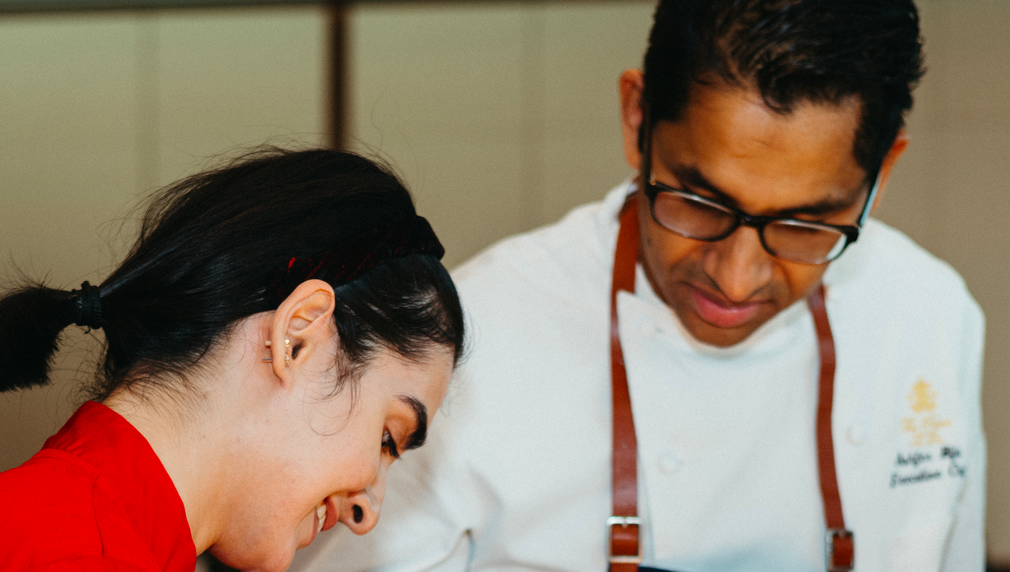From Restaurant Readiness to Culinary Entrepreneurship
This program, led by two local chefs and Careers through Culinary Arts Program (C-CAP) alums, will shepherd a group of primarily Latinx, Black and Asian high school students through the necessary steps to launch a career in the culinary industry, with a focus on the financial equity gained through business ownership.

What is the primary issue area that your application will impact?
Youth Economic Advancement (sponsored by Funding Partner, TBA)
In which areas of Los Angeles will you be directly working?
San Fernando Valley
County of Los Angeles
LAUSD (select only if you have a district-wide partnership or project)
In what stage of innovation is this project, program, or initiative?
Expand existing project, program, or initiative
What is your understanding of the issue that you are seeking to address?
A majority of our students–90%--come from low-income families, and thus contribute to household expenses and overall support. Finding these students reliable, high-paying income directly benefits Angeleno families. But we want our students to have more than a job–we want them to build wealth. Equity, through home and business ownership, is a key step in closing the racial wealth gap. This program, through its focus on self-sustained entrepreneurship, is part of our mission to provide pathways to educational, professional and financial success for young people. In addition, by ensuring that our students are also ready to work in demanding Los Angeles restaurant kitchens, we are helping to alleviate the current labor shortage in the hospitality industry.
Describe the project, program, or initiative this grant will support to address the issue.
By continuing our established, successful nationwide program of Career Readiness and Awareness, and expanding it with a focus on the practical steps necessary to become a business owner, our students will gain the necessary tools to be successful and grow the thriving Los Angeles food scene. As discussed further in question 11, this will be an eight-month program led by two highly successful food entrepreneurs who have worked with some of the most celebrated restaurants and hotels in the world. They are alumni of our program and fully understand the obstacles facing these students. Integral to this program is the stipends we will provide to students to support their entrepreneurial or work endeavors: the biggest hurdle to launching a successful business is money; and for our population of students, 90% of whom come from low-income backgrounds, this hurdle is significantly higher. By providing our students with direct payments, they may use that money to launch a website, pay for marketing materials such as labels or logo design, purchase supplies such as knives or groceries, and many other possibilities. We will measure success by the steps students take toward professional development that they’d never before attempted, due in part to financial barriers. In other words, success will be measured by the ideas students generate; and how they execute them and the job opportunities they obtain.
Describe how Los Angeles County will be different if your work is successful.
If our program is successful, there will be multiple new businesses, launched by locals from underserved communities. But beyond that, we hope that the mentorship we provide to students, in part by connecting them with strong role models–other culinary professionals who share their backgrounds–will be something they pay forward, a common and meaningful occurrence as evidenced by the program’s instructors, who are C-CAP alums.
What evidence do you have that this project, program, or initiative is or will be successful, and how will you define and measure success?
For decades, C-CAP has worked with underserved youth, providing them with an intensive job training program which includes meaningful employment with major restaurants and hospitality companies. The way we measure our short-term impact is by the fact that many of these students continue on as employees with our industry partners. The way we measure our long-term impact is by the hundreds of success stories we hear from our alumni. They are restaurateurs, small-business owners, television personalities, Master Sommeliers and food industry executives. We also measure the long-term impact by the philanthropic and community initiatives they support such as The Roots Fund, which seeks to create diversity and equity in the wine industry.
Approximately how many people will be impacted by this project, program, or initiative?
Direct Impact: 30
Indirect Impact: 1,000